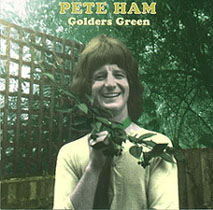
Badfinger were a Welsh rock band formed in 1961 in Swansea, Wales. Their best-known lineup consisted of Pete Ham (guitar), Mike Gibbins (drums), Tom Evans (bass), and Joey Molland (guitar). They are recognised for their influence on the 1970s power pop genre. It is estimated that the band sold 14 million records.
This is the discography of Apple Records, a record label formed by the Beatles in 1968. During its early years, the label enjoyed a fair degree of commercial success, most notably with Mary Hopkin and Badfinger, as well as discovering acts such as James Taylor and Billy Preston who would go on to greater success with other labels. However, by the mid-1970s, Apple had become little more than an outlet for the Beatles' solo recordings. After EMI's contract with the Beatles ended in 1976, the Apple label was finally wound up. The label was reactivated in the 1990s with many of the original Apple albums being reissued on compact disc, and the company now oversees new Beatles releases such as the Anthology and 1 albums as well as the 2009 Beatles remastering programme. In 2010, Apple set about remastering and reissuing its back catalogue for a second time.

No Dice is the third studio album by British rock band Badfinger, issued by Apple Records and released on 9 November 1970. Their second album under the Badfinger name, but their first official album under that name, and first to include guitarist Joey Molland, No Dice significantly expanded the British group's popularity, especially abroad. The album included both the hit single "No Matter What" and the song "Without You", which would become a big hit for Harry Nilsson, and later a hit for Mariah Carey.

Straight Up is the fourth studio album by the Welsh rock band Badfinger, released in December 1971 in the United States and February 1972 in Britain. Issued on the Beatles' Apple record label, it includes the hit singles "Day After Day" and "Baby Blue", and the similarly popular "Name of the Game", all of which were written by singer and guitarist Pete Ham. The album marked a departure from the more rock-oriented sound of Badfinger's previous releases, partly as a result of intervention by Apple Records regarding the band's musical direction.

Peter William Ham was a Welsh singer, songwriter and guitarist best known as a lead vocalist of and composer for the 1970s rock band Badfinger, whose hit songs include "No Matter What", "Day After Day" and "Baby Blue". He also co-wrote the ballad "Without You", a worldwide number-one hit for Harry Nilsson that has become a standard covered by hundreds of artists. Ham was granted two Ivor Novello Awards related to the song in 1973.
"Without You" is a song written by Pete Ham and Tom Evans of British rock group Badfinger, and first released on their 1970 album No Dice. The power ballad has been recorded by over 180 artists, and versions released as singles by Harry Nilsson (1971) and Mariah Carey (1994) became international number one hits. The Nilsson version was included in 2021's Rolling Stone's 500 Greatest Songs of All Time. Paul McCartney once described it as "the killer song of all time".
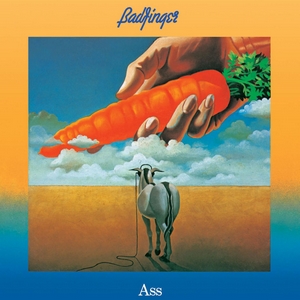
Ass is the fifth studio album by British rock band Badfinger, and their last album released on Apple Records. The opening track, "Apple of My Eye", refers to the band leaving the label to begin its new contract with Warner Bros. Records.
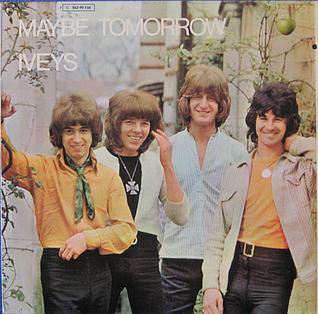
Maybe Tomorrow is the debut album by British rock band Badfinger. Maybe Tomorrow is the only release under the band's original name as The Iveys. It was issued in 1969 on the Apple label in Japan, West Germany and Italy. Although the album was scheduled to be released worldwide, the release in the US and UK at that time was halted without explanation. Many reasons for halting the album have been suggested by the band and Apple employees, but the most common theory is that Apple's newly hired president, Allen Klein, stopped all non-Beatle releases on Apple until he could examine the company's finances, which were in disarray at the time.

Michael George Gibbins was a Welsh musician, most notable for being the drummer of Badfinger.
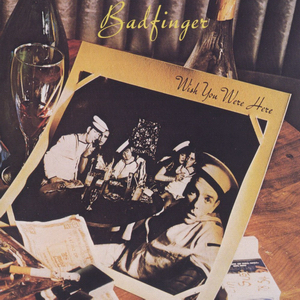
Wish You Were Here is the seventh studio album by rock band Badfinger and their third consecutive album produced by Chris Thomas. It was recorded in the spring of 1974 at Colorado's Caribou Ranch and released in November of that year on Warner Bros. Records. Wish You Were Here was the second and last album the band released on the Warner Bros. label.
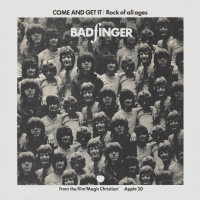
"Come and Get It" is a song composed by English singer-songwriter Paul McCartney for the 1969 film The Magic Christian. The song was performed by Badfinger, produced by McCartney and issued as a single 5 December 1969 in the UK, and 12 January 1970 in the US, on the Beatles' Apple label. It was the band's first release under the Badfinger name and was their international breakthrough, hitting the top 10 in both the UK and US singles charts.
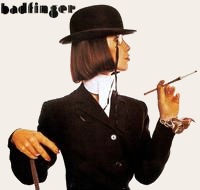
Badfinger is the sixth studio album by British rock band Badfinger. The album was recorded in autumn 1973 and released in 1974 on Warner Bros. Records. It was the first of two albums released by the band on the Warner label. The cover art for the album shows a woman wearing a riding outfit and hat from the 1920s and smoking a cigarette in a cigarette holder.
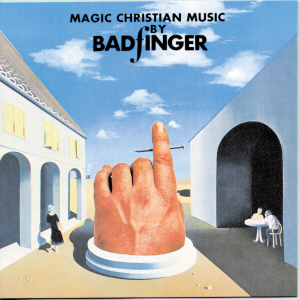
Magic Christian Music is the second studio album by the British rock band Badfinger, released on 9 January 1970 on Apple Records. It was their first release under the Badfinger name, having previously released the album Maybe Tomorrow in 1969 under the name The Iveys. It includes the band's first international hit, "Come and Get It", written and produced for them by Paul McCartney.

Head First is the tenth and final studio album to be released by British rock band Badfinger, released on 14 November 2000, but recorded over 25 years earlier at the Beatles' Apple Studios in London, although it was not released at the time. Originally intended to be Badfinger's eighth album, the recordings were shelved when legal difficulties erupted between the band and WB that year, and the version that was finally released was a rough mix of the album made in 1975 by Phil McDonald, one of the recording engineers at Apple Studios.
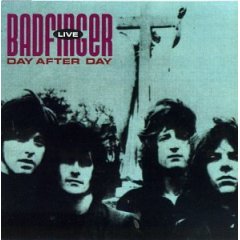
Day After Day: Live is a CD release by Rykodisc in 1990 of live recordings made by the British rock group Badfinger in 1974.
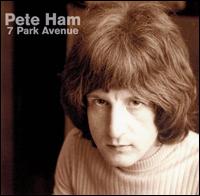
7 Park Avenue is the first of four posthumous CD releases of demo material recorded by Badfinger's Pete Ham. The recordings are taken from various eras, beginning with compositions he wrote during his years with The Iveys from 1967 to 1969, and running throughout his tenure with Badfinger, ending with his suicide in 1975. The majority of these recordings were made on The Iveys' Sound-On-Sound Revox mono tape machine. Many of the songs highlight Ham playing all the instruments. However, session musicians occasionally augment some of the tracks, most notably former Badfinger member Bob Jackson and former Iveys member, Ron Griffiths. All of the vocals and guitar licks are Ham's original performances.

"No Matter What" is a song originally recorded by Badfinger for their album No Dice in 1970, written and sung by Pete Ham and produced by Mal Evans.

Thomas Evans was an English musician. He is best known for his work as the bassist of the band Badfinger. He also co-wrote their 1970 song "Without You," which has been recorded by over 180 artists — most notably Harry Nilsson and Mariah Carey. Evans died by suicide in 1983, one of two members to do so.

The Place I Love is the debut album by English vocal duo Splinter, released on Dark Horse Records in September 1974. It was the first album released by the Dark Horse label, which was owned by George Harrison, who also produced the album. Recording sessions took place at Harrison's Friar Park home studio in Oxfordshire and featured extensive musical contributions from Harrison, on guitar, keyboards and other instruments, as well as participants such as Gary Wright, Billy Preston, Jim Keltner and Alvin Lee. "Costafine Town", the first single from the album, was a top-twenty hit in the United Kingdom and other countries.

Brother is the debut album by the American pop-rock duo Lon & Derrek Van Eaton. It was released on the Beatles' Apple record label in September 1972 in the United States and February 1973 in Britain. It includes the single "Sweet Music", produced by George Harrison, and was otherwise produced by Klaus Voormann, a friend and longtime associate of the Beatles. On release, the album received favorable reviews from music critics but failed to achieve commercial success. Rolling Stone critic Stephen Holden hailed it as a "staggeringly impressive first album".
